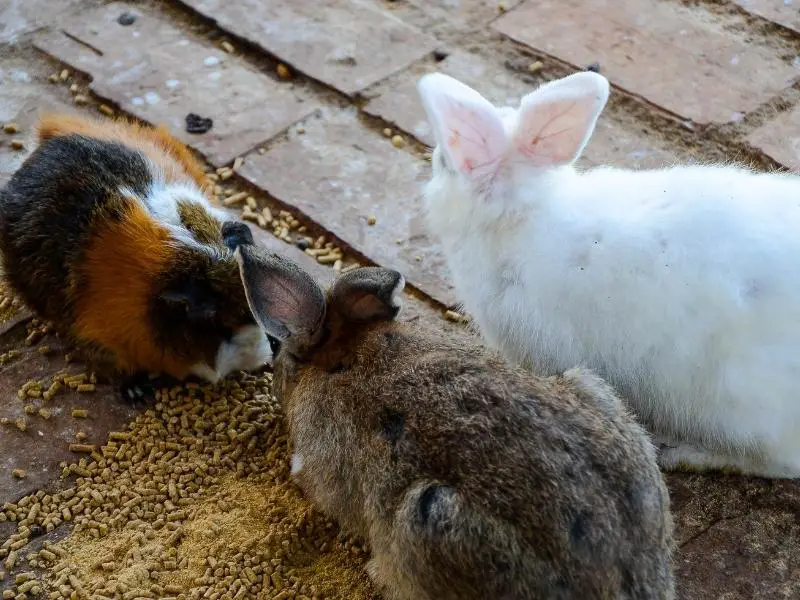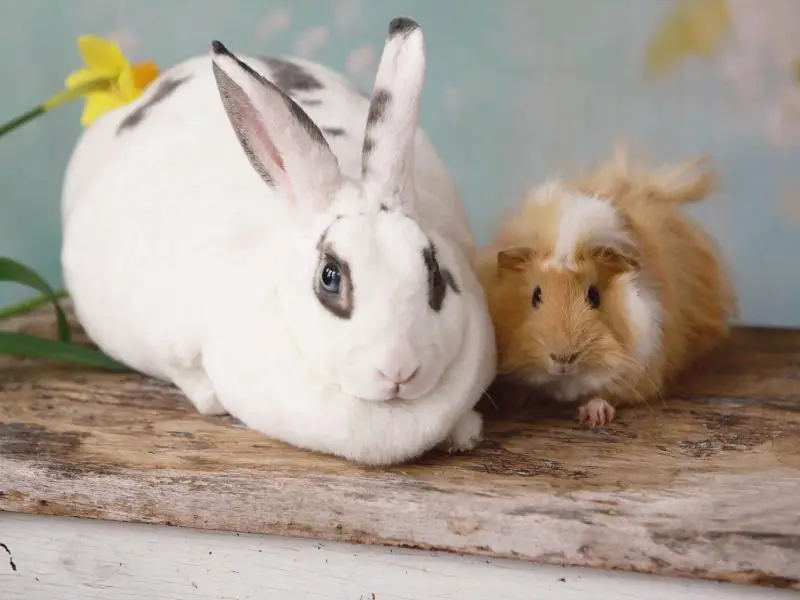If you have a multi-pet household, it is only natural to wonder if your other animals can live together with your rabbit. What about your rabbit and guinea pig sharing an enclosure? Is it possible for rabbits and guinea pigs to live together?
After all, both animals are cute and cuddly and are very social. But should they be roomies?
Rabbits and guinea pigs should not live together. Housing these two animals in the same enclosure could spell disaster. They have different dietary needs and personalities, carry diseases that can be fatal, and rabbits can bully or easily harm your guinea pig.
Let’s look at why a rabbit and a guinea pig living together is not a match made in heaven.
Do Rabbits and Guinea Pigs Fight?
A rabbit and a guinea pig may not necessarily fight with each other, but it isn’t likely that these two animals will get along.
While your rabbit may not intentionally want to harm your guinea pig (or cavy), it can hurt it during playtime. Rabbits are much larger and stronger than a cavy (but more on this later).
Is It Good to Keep Rabbits and Guinea Pigs Together?
It isn’t a good idea to keep rabbits and guinea pigs together. Not in a hutch or in a play area for playtime.
They both communicate and behave differently. So if they are placed in the same run or hutch, they won’t understand each other or be able to get along.
There are also other reasons why these two animals should not be housed together.
Dangers of Keeping Rabbits and Guinea Pigs Together

Here are the 5 main reasons why guinea pigs and rabbits should not live together:
Differing Diet Needs
Both guinea pigs and rabbits live on roughage like good quality hay and fresh veggies. This may be why you think the two animals should get along and live in the same hutch.
However, rabbits can make the vitamin C they need while guinea pigs need a diet that is rich in vitamin C. If your rabbit ingests too much of this vitamin, they can become ill and an expensive trip to the vet will be a given in your near future.
If your guinea pig doesn’t get sufficient amounts of vitamin C, they will develop the guinea pig version of scurvy. They will also get diarrhea, lose hair, become listless, and bleed internally.
Different Ways of Communication
Bunnies and guinea pigs don’t behave the same and they don’t communicate in the same way either. For example, if you have bonded two rabbits, then they will play with each other, groom each other, and enjoy being together. Guinea pigs like to keep to themselves.
Since they are unable to understand each other, they won’t be able to get along and this may result in conflict.
Rabbits Carry Harmful Disease
Rabbits carry Bordetella Bronchiseptica, which can easily be transmitted to your guinea pig. This bacteria causes inflammation in the bronchi and trachea, and it leads to a serious respiratory disease.
Rabbits Are Stronger
A bunny is much bigger and stronger than a guinea pig. Your rabbit may not mean to hurt the cavy, but if they can easily hurt the guinea pig with a swift kick, which can happen as the bunny bounces around the enclosure.
Your rabbit may also lash out with a kick – and their hindlegs are strong – when they get scared or annoyed. A kick can seriously hurt the guinea pig, or even kill it.
Rabbits also have sharp claws, so swiping at the guinea pig will result in injuries. If they strike at a guinea pig’s face, blindness, infection, and corneal ulcers can occur.
Because rabbits are bigger, they can also get possessive over the food you put in the enclosure, which means that the guinea pig won’t get the nourishment they need.
Moreover, if you have a male rabbit (a buck) that hasn’t been neutered, it may try to mount the guinea pig. This can injure the cavy’s back.
Different Exercise Needs
Rabbits and guinea pigs also have different needs for exercising. A bunny needs a large run or exercise area in which it can run, jump, and skip around. Interestingly, wild rabbits run or jump a distance equal to 30 tennis courts daily.
On the other hand, guinea pigs have short legs, so they don’t need as much space to exercise.
Rabbits Can Bully the Guinea Pig
Out of boredom or for entertainment, your bunny may try to “play” with the guinea pig. However, because they are stronger and bigger, your rabbit will bully the guinea pig.
Your rabbit may try to bite the guinea pig, and any supposed playful acts from the rabbit will stress the guinea pig out.
What Other Animals Can Live With Rabbits?
There are a few animals that can live with your pet rabbit; however, it is best to house your bunnies separately:
- Dogs – but beware of larger dog breeds with predatory instincts
- Cats – also have a predatory instinct, so it’s advisable to not leave your rabbit alone with your cat
- Chickens – rabbits and chickens can live together if the enclosure is large enough and you meet both animals’ needs
- Ducks
- Chinchillas
- Squirrels
Guinea Pigs and Rabbits: The Case of Social Misfits
Both rabbits and guinea pigs make excellent and adorable pets but they shouldn’t be housed together. These two animals are simply too different and won’t get along.
Your best bet if you want a companion for a rabbit is another rabbit, and for a guinea pig, it is a guinea pig friend.
That being said, there are cases of rabbits and guinea pigs striking up an unlikely friendship.
The key to this pairing is giving each enough space in the enclosure, a safe or hiding place where the guinea pig can retreat if it needs to, and ensuring they eat separately. Most likely, this rabbit and guinea pig was introduced when they were both young and they simply adapted well to each other.
Nevertheless, never force a pairing if you want to try to have a young bunny and a young guinea pig living together. If you see one losing weight or becoming depressed, then separate the animals and it may be best to then keep them separate.

